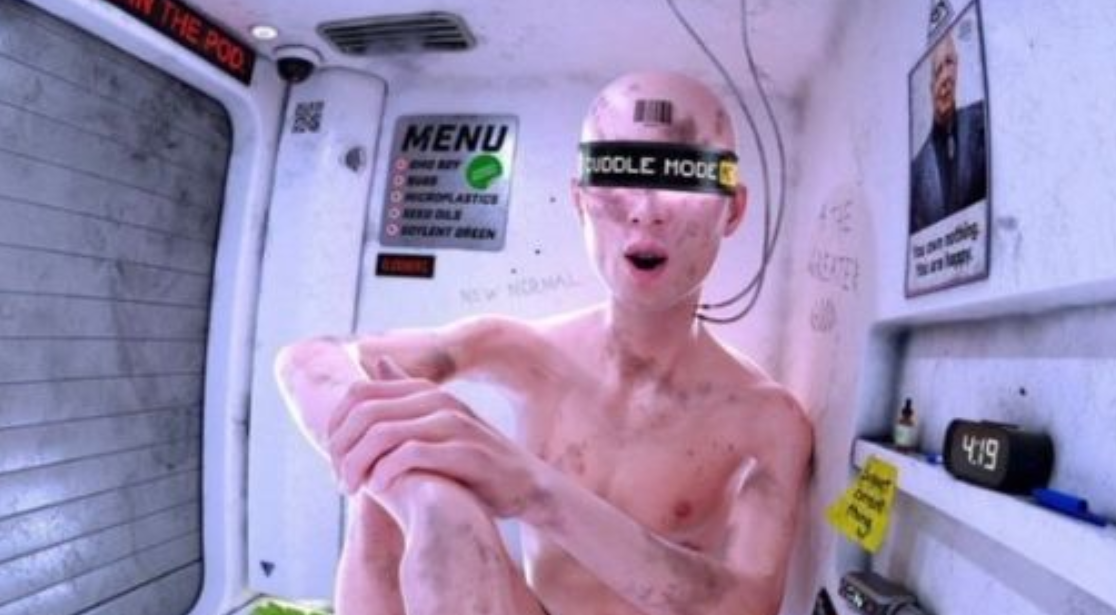No, It Does Not Make You a Racist to Reject Eating Bugs or Living in Pods
The corporate media propagandists are working overtime to convince the public there’s no reason to fear eating bugs or living in tiny pods.
In early March, NPR released a propaganda piece attempting to draw a line between racism and people who are questioning the agenda to encourage the public to eat bugs and to live in smaller spaces.
The opposition to these proposals sometimes comes packaged in memes stating “I will not eat ze bugs” or “I will not live in ze pod”, complete with faux German accent meant to mock World Economic Forum founder Klaus Schwab. The WEF and Schwab are largely responsible for helping propel the idea that bugs are the preferred protein source in the fight against climate change.
Independent journalist James Corbett does a great job debunking NPR’s claims that only crazy people believe there is an effort to promote eating bugs. He highlights numerous examples of the mainstream implanting the idea that bug protein is humanity’s future. Even actress Nicole Kidman was a good propagandist and allegedly ate bugs for Vanity Fair. While the NPR podcast does everything it can to avoid actually investigating if groups like the WEF are involved in promoting the bug agenda, the WEF YouTube channel and website are rife with examples.
The podcast also spends a few moments poking fun at those who are concerned by articles and videos professing the benefits of living in smaller spaces, sometimes referred to as “pods”. The NPR hosts are quick to let you know that only white nationalists and those suffering from “white guilt” are worried about pods. However, many critics of this effort believe the focus on smaller living spaces is part of the same agenda that told the public “You Will Own Nothing and Be Happy”, a phrase first heard from the fine folks over at the World Economic Forum.
This phrase was also part of the WEF’s Great Reset agenda, announced in June 2020 with a book from Klaus Schwab, and flashy marketing videos promoting the concept. The Great Reset was described by the WEF as a transformation of the economic, governmental, healthcare, food production, and technological systems which underpin all of human life. The WEF said COVID-19 presented the opportunity to radically change the world and The Great Reset agenda was their effort to do just that.
The launch of The Great Reset was supported by Schwab, as well as England’s Prince Charles; Antonio Guterres, Secretary-General of the UN; and Kristalina Georgieva of the International Monetary Fund. The WEF spent all of 2020 and 2021 spinning their propaganda, and partnering with governments and private businesses that share their goals of a world run by Technocrats who make top down decisions for the masses in the name of fighting for diversity and sustainability.
Since 2020, it has become clear groups the WEF are encouraging the public to own less property. The idea being that instead of owning individual vehicles or homes, we will use driverless autonomous vehicles, share housing or live in smaller spaces, and rent the things we need and use. If we look around the world of 2024 we can see that many people have already accepted this subscription-based model. Netflix, Amazon, Hulu, Spotify, etc are all based on this model where users do not actually own their movies or music, but simply rent them from corporations who can take down content as they please.
 How to Opt-Out of the Technocratic State: 2nd Edition
How to Opt-Out of the Technocratic State: 2nd Edition
I Will Not Live in a Pod
But, what about this whole living in pods thing? Is there actually truth to the fears about an agenda to force the public into pods?
NPR’s crack reporters also claim that the “racist” folks who are worried about being forced to eat bugs are also falling for climate denialism when they repeat the phrases “I will not eat the bugs” or “I will not live in a pod”.
A quick search on the alleged benefits of living in smaller spaces brings up headlines such as This tiny sustainable home could be the future of living; Are There Mental Health Benefits to Living in a Small Space?; It’s Cozy and Cheap, but Do You Want to Live in This Social Media Magnet?; and I downsized my big house for a rental home and sold most of my stuff. I feel like I can breathe for the first time in years.
What about specific mentions of living a pod? I found these headlines – Can’t afford California housing? Try living in a tiny sleeping pod. All 4 feet of it; Pod Living: What It Is and Why It’s Booming; and People have concerns after man shows what it’s like living in $700 sleeping pod.
We can also note that the growth of the Tiny Home movement in recent years as a potential example of the impact of this concept.
The fear of “living in pods” goes even deeper than concerns about being cramped into tiny spaces in giant apartment buildings with little access to the Sun and Earth. As evidenced by the meme below, the fear of pods is also tied to opposition of efforts to push humanity further into the digital world via concepts like the metaverse, augmented, virtual, and extended reality, and transhumanism.
This one? pic.twitter.com/OrDiAU6MIX
— Just.A.Thought




